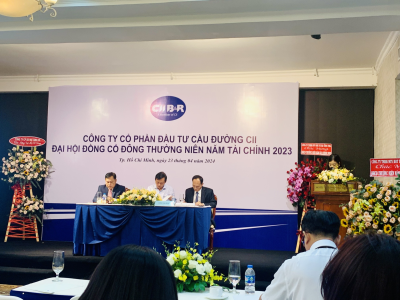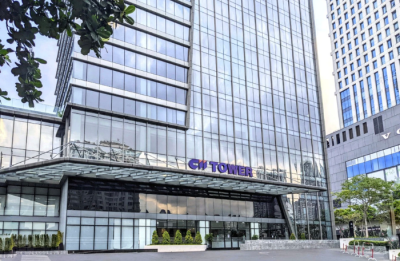Annual Shareholders' Meeting CII: Planning to acquire another BOT project in June-July 2024
Admin2
2024-07-15T21:53:59-04:00
2024-07-15T21:53:59-04:00
https://ciibr.com.vn/en/news/company-activities/annual-shareholders-meeting-cii-planning-to-acquire-another-bot-project-in-june-july-2024-10.html
https://ciibr.com.vn/uploads/news/2024_07/cau-sg-1.png
CII Bridges And Roads Investment Joint Stock Company
https://ciibr.com.vn/uploads/ciibr_logo_trans.png
Monday - 15/07/2024 21:48
On the morning of May 21st, Technical Infrastructure Investment Corporation of Ho Chi Minh City (stock code CII on HoSE) held its second annual shareholders' meeting after the first one could not be organized.
At the second General Meeting, there were 119 shareholders and authorized representatives present, equivalent to representing 36.11% of the total circulating shares, meeting the required conditions for the meeting.
In 2024, Ho Chi Minh City Technical Infrastructure Investment Corporation planned for a total revenue of 4,194 billion VND, a decrease of 11.3% compared to the same period last year. The after-tax profit attributable to the parent company's shareholders is projected to be 430 billion VND, an increase of 9.7% from 2023.
Regarding the business plan for 2024, Ho Chi Minh City Technical Infrastructure Investment Corporation stated that it will maintain stable operations of BOT (Build-Operate-Transfer) road projects to ensure stable revenue and consistent growth for the company. They aim to continue restructuring and mobilizing new capital to optimize cash flow efficiency from BOT projects.
They will focus on capital and profit recovery from investments, continue to research new infrastructure projects, and assess suitable investment opportunities to expand operational scale.
In the road infrastructure sector, the revenue for 2024 is expected to increase by nearly 45% to 2,441 billion VND. This growth is attributed to increased toll fees from the expansion projects of National Highway 1 in Ninh Thuan province and the Cau Co Chien Bridge. Additionally, merging the revenue from the Trung Luong - My Thuan Expressway project contributed to this increase.
It is noted that since Q4 2023, the corporation has merged the Trung Luong - My Thuan BOT project.
"The company is currently in negotiations to acquire 100% ownership of a BOT project with an investment amount of approximately 1.6 trillion VND, expected to finalize by the end of June and early July 2024," announced Mr. Le Quoc Binh, the CEO, after successfully merging the Trung Luong - My Thuan BOT project in Q4 2023.
In the real estate sector, Ho Chi Minh City Technical Infrastructure Investment Corporation plans to continue stable operations, enhance business activities, lease office spaces, and commercial areas. They also aim to complete legal documents for their projects.
Regarding financial status, the corporation aims to prioritize paying off loans on time to reduce interest costs. The need for additional shareholder capital in ongoing projects will decrease, resulting in a significant surplus of capital that can be quickly used to repay all financial debts at the parent company.
"Increasing shareholder capital and reducing debt are necessary and important steps for the company to participate in large-scale projects ranging from 10,000 to 30,000 billion VND after 2024," emphasized Mr. Le Quoc Binh.
Regarding profit distribution plans, Ho Chi Minh City Technical Infrastructure Investment Corporation approved a cash dividend plan of 16% for 2023 and intends to maintain the same rate for 2024.
Discussion:
CEO Le Quoc Binh addressed all shareholder inquiries at the General Meeting.
Is there assurance of long-term dividend distribution to shareholders despite remaining large debts?
For BOT operations, under laws and regulations, BOT projects have a capital structure of 11% equity and 89% debt, with a debt-to-equity ratio of up to 9 times considered an investment in BOT projects. The corporation currently maintains a debt-to-equity ratio of less than 3 times, which is very safe compared to industry averages.
"If investing in other sectors, a debt-to-equity ratio of 3 times would be considered high, but in BOT projects, it is low. Revenue from BOT projects consistently increases due to traffic flow and toll price increases (pledged by state agencies), alongside guaranteed profits from state agencies to investors. Therefore, investments in BOT projects are very safe," emphasized Mr. Binh.
Furthermore, Mr. Binh shared that under new laws, state agencies no longer guarantee profits for BOT projects, leaving investors to bear risks and returns. Looking ahead, new BOT projects will have an equity-to-debt ratio of 1:1.
Anticipating legal regulation changes, in the past year, the corporation increased capital by issuing convertible bonds, planning further increases in shareholder capital to participate in new BOT projects.
Additionally, Mr. Binh discussed exceptional cases where BOT investors face difficulties, stating, "Except when toll revenue is insufficient to cover loan interest. If a BOT project reaches such a situation, where revenue is insufficient to cover interest payments, investors may face difficulties. In such cases, CII, with 20 years of experience, carefully selects BOT projects for investment."
Regarding dividend policy, the corporation plans to maintain a 16% annual dividend, but there is no commitment to consistently distribute dividends every year. The company strives to maintain this dividend rate. However, Mr. Binh noted that assuming the company wins a project bid and faces difficulties in securing bank loans, it could balance cash flows for investment and then compensate shareholders with dividends in subsequent years.
"Up to this moment, the company continues to maintain a quarterly dividend rate of 4% (16% per annum)," emphasized Mr. Binh.
Which revenue saw a significant decline compared to 2023?
In 2023, the company still had revenue from the real estate sector, which decreased from 2024-2025 due to the challenging progress of legal compliance. Hence, revenue related to the real estate sector declined.
What are the forecasts for the real estate sector and the resolution of legal issues for the company's owned projects?
For projects in the Thu Thiem area (Ho Chi Minh City), the company has not yet resolved any issues related to Thu Thiem. Up to this point, there have been no legal resolutions for projects in Thu Thiem. Many reports indicate that the Thu Thiem projects may resolve legal issues in the near future.
However, Mr. Binh also mentioned, "The company cannot predict the implementation or profit recognition of real estate projects owned by Năm Bảy Bảy."
Regarding projects in the Năm Bảy Bảy area, legal difficulties are similar to those in Thu Thiem projects. In particular, after more than two years of submission, the company obtained one signature related to real estate, making it difficult to resolve legal issues. The company also anticipates that the new Land Law and Housing Law will help resolve these legal issues.
"The company cannot predict the implementation and profit recognition of real estate projects owned by Năm Bảy Bảy," Mr. Binh added in discussions with shareholders.
To what extent has the company implemented plans to acquire industrial park infrastructure projects?
Basically, the company has negotiated and completed the transfer of the project, with funding for implementation completed. It is expected to complete the transfer by the end of June and early July 2024. The project is anticipated to commence operation in Q1 2025, with a total investment of 1,650 billion VND. The company is proposing to double the scale because the project is located on the main road of six provinces in the Southeastern region, making the current four-lane road scale unsuitable.



